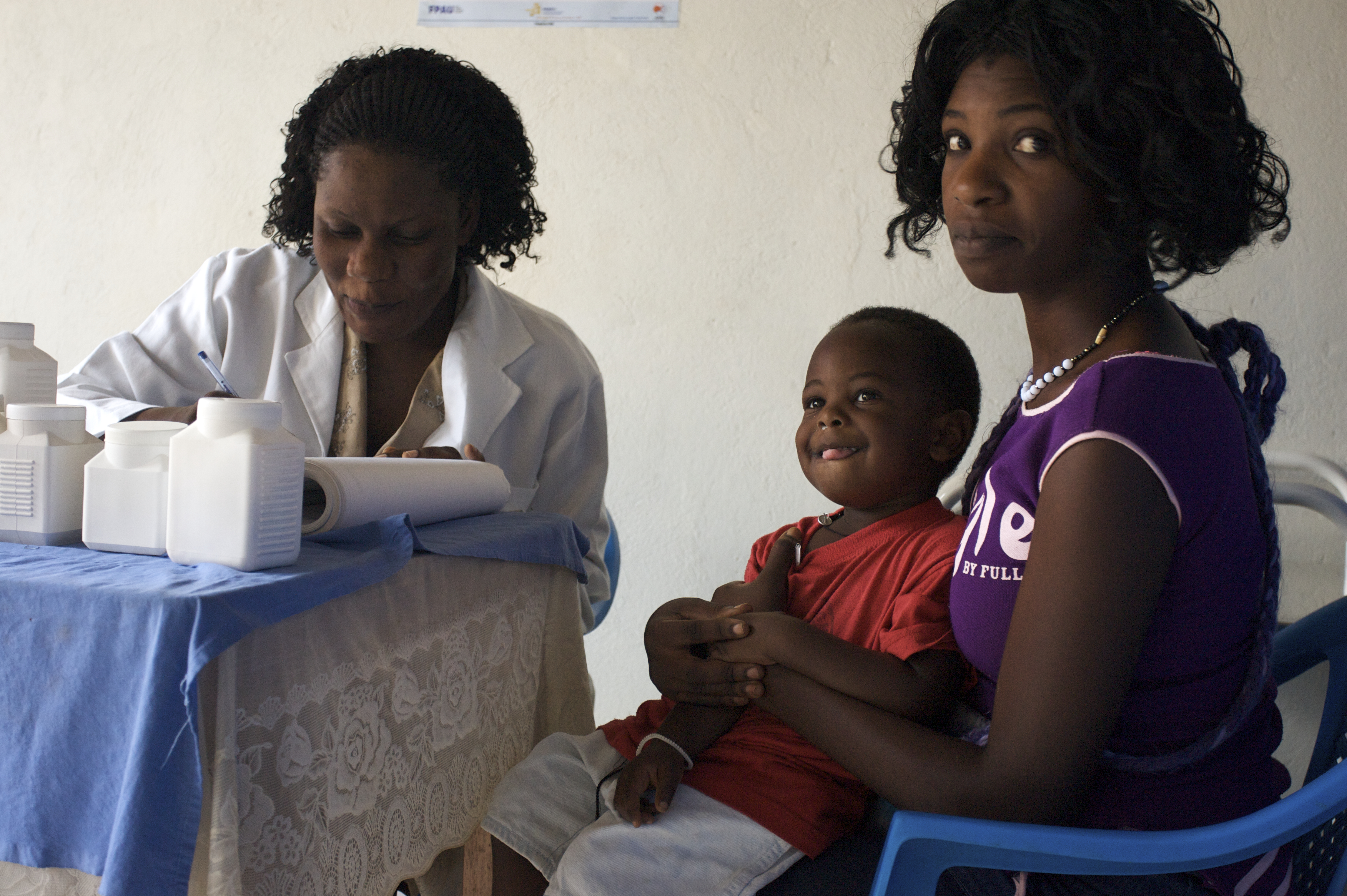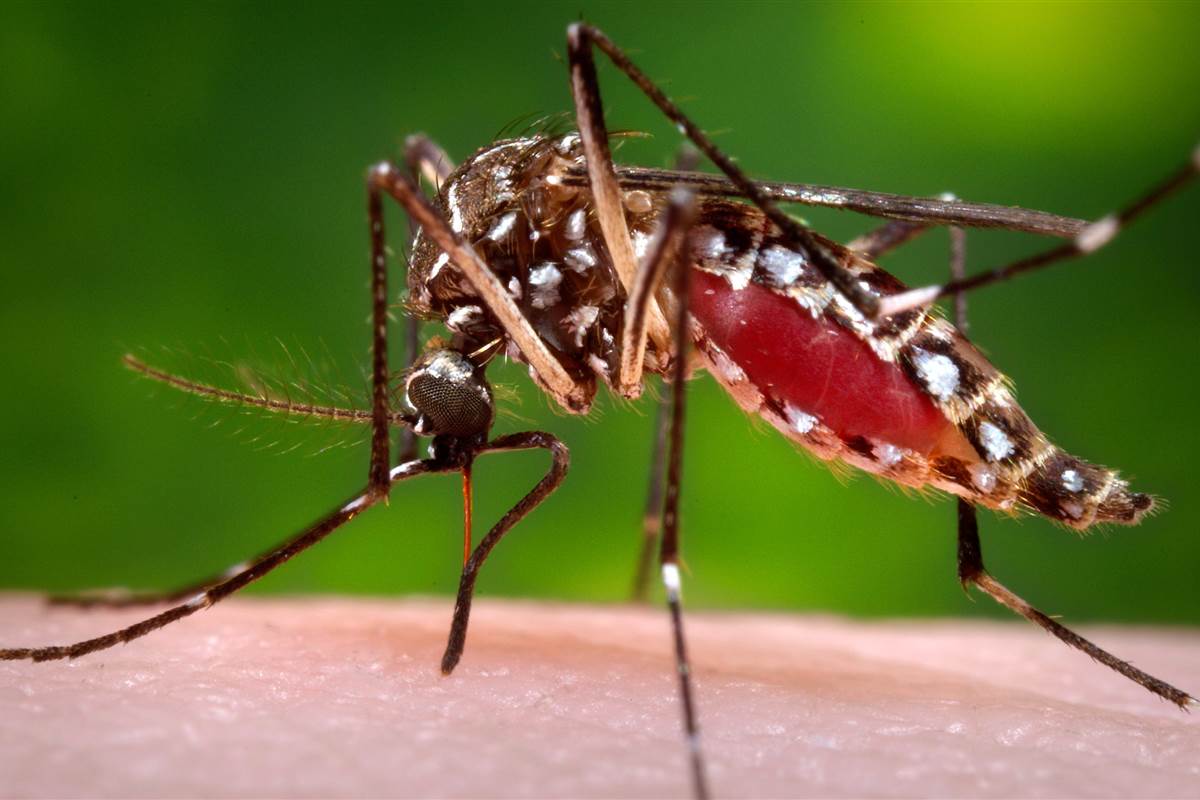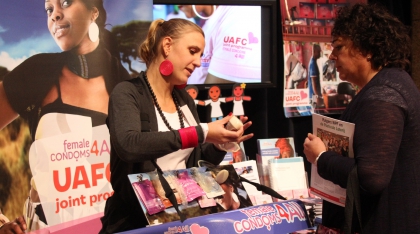
| 19 February 2016
IPPF calls for G7 leaders to prioritize the full range of sexual and reproductive health care services in Universal Health Coverage
18 February, Tokyo:The International Planned Parenthood Federation (IPPF) calls for G7 leaders to prioritize the full range of sexual and reproductive health care services in plans for Universal Health Coverage in their forthcoming Ise Shima G7 Summit in May. IPPF made this call at this week’s G7 Health Experts’ Meeting in Tokyo. IPPF said sexual and reproductive health care (SRH)services are essential because they save lives, are cost effective and offer universal benefits. IPPF highlighted that SRH services are critical to achieving women’s empowerment, equality and full participation in society. These services play a crucial part in the development of resilient health systems that can help reduce the impact of humanitarian disasters. Giselle Carino, IPPF Western Hemisphere Regional Director Designate, who attended at the meeting said: "Governments (public sector) cannot work alone to ensure that no-one is left behind. Locally-owned organizations, such as IPPF Member Associations, are working at the frontline supporting communities, particularly poor and underserved people including women and adolescents, to make a real and sustainable difference in their health status and realize human security. G7 leaders must recognize the role of civil society in health system strengthening and building a new global health architecture". IPPF also calls for: The principle of Universal Health Coverage: that everyone has the right to health without facing financial hardship and no social groups can be left behind. Essential sexual, reproductive, maternal, new-born, child and adolescent health services at the primary care level should be a priority of Universal Health Coverage because investment in these services is among the most cost-effective interventions that a health system can provide. The importance of the social and gender determinants of health should be recognized by mainstreaming gender equality into Universal Health Coverage and national health strategies. Making significant progress on both targets 3.7 and 3.8 would be transformative. Therefore IPPF urges the G7 to prioritize discussion of how these targets can be achieved during preparations for the Ise-Shima summit and in particular calls on the G7 to ensure that sexual and reproductive health services are prioritized in plans for Universal Health Coverage.

| 04 February 2016
Global response to Zika must provide contraceptives to all says IPPF
As a case of sexually transmitted Zika infection was reported in the US yesterday, the International Planned Parenthood Federation’s (IPPF) Director General, Tewodros Melesse urged that more must be done to ensure contraceptive access is at the forefront of the response. In a statement by IPPF’s Director General, Tewodros Melesse said in response to reports of Zika in Ireland and US yesterday. “The World Health Organization (WHO) on Monday declared Zika a Public Health Emergency of International Concern. Further guidelines are needed for a comprehensive effort to tackle the epidemic. We need more guidance from WHO to ensure that the rights of women are at the forefront of the Zika response. Updates are essential now that sexual transmission is emerging as a potential mode of infection that puts people at risk.” It is clear that further surveillance and research is necessary to confirm if this is a possible mode of transmission. If proved that the Zika virus can be sexually transmitted, it will be important to ensure the integration of sexually transmitted infections (STI) prevention strategies as part of control efforts. The Centres for Disease Control (CDC) reported that it is likely that the infection in the US was transmitted through sexual contact. IPPF will continue to monitor the situation. With this potential for sexual transmission, it is advised to ensure access to condoms and to promote use along with other forms of contraceptive methods. Male and female condoms are effective for preventing unintended pregnancies as well as the transmission of HIV and other sexually transmitted infections (STIs). In response to the calls for women to delay pregnancy in some of the affected countries, Mr Melesse said “It is essential to recognize that women have the right to make decisions about their reproduction, including if and when they have children, but this is not always possible in areas of poverty and where sexual and gender based violence rates are high.” “Delaying pregnancy will not be an option for some, so every response must be tailored to the individual. The Zika response must include a sensitive approach to pregnant women who are concerned and need testing, while access to contraception should be available to all. Governments must ensure that their medical services have the supplies for those whose want it. We recommend that strengthening family planning programs and access to safe abortion services for those women who need it and where it is permitted by law should be included in the strategies for responding to the Zika outbreak.” IPPF is a network of sexual and reproductive health and rights organisations in 170 countries that are equipped to monitor and respond to any member of the public who wants information, services, contraception and access to abortion and are available to serve at the first point of response. For further information and interviews contact press office 02079398227

| 29 January 2016
Fight Zika virus with better access to contraception and safe abortion as well as anti-mosquito measures, says IPPF
The Zika virus must be fought with better access to contraception and safe abortion as well as anti-mosquito measures, Tewodros Melesse, Director General of the International Planned Parenthood Federation has said today. In a statement of solidarity with the World Health Organisation, he told WHO Director General Dr Margaret Chan that the IPPF – the largest sexual and reproductive health service network in the world – supported her call for an emergency meeting in Geneva on Monday 1 Feb and was already taking action. “We recognise the urgency and have initiated our response” he said. “The IPPF Western Hemisphere – our region covering South America, the Caribbean and North America - has shared WHO guidelines on Zika with all its Member Associations, partners and staff.” Tewodros Melesse said the IPPF would call on its Member Associations to help lead the global response to the Zika outbreak. “The IPPF is ready to act swiftly, building on our global experience and expertise in sexual and reproductive health.” He stressed Zika’s impact on women, in particular poor and vulnerable women. “In the affected areas approximately half of pregnancies are unplanned. Poor women and women in rural areas are more susceptible to infection and less likely to have access to sexuality education and contraception,” said Tewodros Melesse. In Latin America and the Caribbean, an estimated 23 million women have an unmet need for contraception and account for 75% of unintended pregnancies in the region. Latin America is also home to some of the most restrictive abortion laws in the world. Tewodros Melesse urged that the fight against Zika must include access to contraception and safe abortion. He said: “We recommend that strengthening family planning programs and access to safe abortion services for those women who need it and where it is permitted by law should be included in the strategies for responding to the Zika outbreak.” Notes to editors For more information, please contact the press office on +44 (20) 7939 8227 IPPF International Planned Parenthood Federation (IPPF) is the world’s largest sexual and reproductive health and rights (SRHR) provider.

| 26 January 2016
Building a movement for change
The International Planned Parenthood Federation (IPPF) today launched its new seven year Strategic Framework which will renew and strengthen its commitment to support the rights of women and girls to decide freely and for themselves whether, when and how many children to have. The Framework was launched at the International Family Planning conference in Indonesia. The Strategic Framework will deliver high impact, quality, rights-based, integrated sexual and reproductive health and rights services – including family planning, safe abortion, HIV, sexual and gender-based violence and reproductive cancers – and support further service provision by public and private health providers. It will help IPPF maximize the number of people it can serve by increasing operational effectiveness, expanding our provision in humanitarian emergencies and increasing national and global income to meet demand. IPPF's Director General, Tewodros Melesse, said launching the Framework “As the largest civil society provider of family planning, we can help meet many of the sexual and reproductive health needs of the Sustainable Development Goals at grassroots level. The new Strategic Framework will help us be more agile and accountable as a Federation, able to make a real impact on sexual and reproductive health and rights on the ground. Our new Framework was developed by our members from across the globe and it will guide their and partners work for the next seven years. At the high level reception with Benoit Kalasa from UNFPA, Dr. Kesete-birhan Admasu the Health Minister from Ethiopia and youth advocate Priya Kath, the IPPF’s Director General Tewodros Melesse announced that it had revised its efforts on family planning to tackle the global goal to reach an additional 120 Million women. IPPF's President, Naomi Seboni said chairing the event, “Every year we help millions of people – last year, that number was almost 62 million. We’re on track to meet our commitments, and we are holding governments to account for the pledges they made. Our new pledge which we will announce on Thursday will help achieve some of the ambition of FP2020 and the new Sustainable Development Goals.” The Strategic Framework is a global joint effort if the ambition of the new goals is to meet the needs of the most vulnerable people. It’s a vision that IPPF is excited about and proud of, that lays out its priorities for the next seven years in four clear outcomes. To get 100 governments to respect, protect and fulfil sexual and reproductive rights and gender equality by galvanising to secure legislative, policy and practice improvements. To engage women and youth leaders as advocates for change. To empower one billion people to act freely on their sexual and reproductive health and rights by 2022. To deliver two billion quality integrated sexual and reproductive health services. We will deliver rights-based services including safe abortion and HIV and enable services through public and private health providers. Over the next seven years IPPF is forging ahead to build a higher performing, accountable and united federation. The Federation is focused to enhance operational effectiveness and double national and global income. It will also build its advocacy and voice by growing its volunteer and activist supporter base. IPPF's mission is to lead a locally owned, globally connected civil society movement that provides and enables services and champions sexual and reproductive health and rights for all, especially the underserved.

| 09 June 2016
Webinar: Comprehensive female condom programming
On 19 November 2015, IPPF is holding a webinar in collaboration with the Universal Access to Female Condom (UAFC) on comprehensive female condom programming. Time: 11:00 AM Central European Time (CET) / 10:00 AM London (GMT) Female condoms are the only women-initiated, dual protection method available. They have been on the market for 20 years and recently many new innovations have emerged. There are now various female condoms available, made of different materials, with a ring, sponge or in the form of a tampon to ease insertion. Variety is the spice of life! Are you interested in (working with) female condoms, or are you working with female condoms but would you like to strengthen your expertise and hear about the latest updates? Join the Universal Access to Female Condom (UAFC) webinar on 'Comprehensive female condom programming: from marketing to advocacy', tailor-made for IPPF regional offices and MA’s. During this 60-90 minute webinar, you will hear all about: Female condom product development: which types are available? This includes also an introduction to the Female Condom Market Intelligence Portal (FCMI); Programming and advocacy experiences from Cameroon and Nigeria; A summary of the Business Case for Female Condoms, which analyses the cost-effectiveness of investing in female condoms; An overview of upcoming female condom advocacy moments that you can link up with; A dialogue on future engagement, including collaboration and support for comprehensive female condom programming. If you wish to join, please send your confirmation to Rineke van Dam :[email protected]. The webinar will be hosted through GoToMeeting. Call-in options will be sent to you after application.

| 09 June 2016
Doortje Braeken receives lifetime achievement award
The World Association of Sexual Health (WAS) has awarded Doortje Braeken – IPPF’s Senior Adviser on Adolescents, Gender and Rights, Programmes & Technical - their prestigious individual Gold Medal in recognition of her lifetime’s contribution to sexual health. She will be presented with the honour at an award ceremony at the biennial WAS Congress in Singapore this July. Doortje tells us what this award means to her and about her career promoting the sexual rights of young people. How significant is this award for you? It’s very significant because WAS is serious about sexual rights and it has a wide ranging membership – including sexologists, neurologists and educators and those working in erotica, the whole spectrum of sex is represented there. They acknowledge how important it is in people’s lives. Why have you won? I’ve been a sex educator since 1984 when I was working for the Dutch Member Association (now known as Rutgers WPF), promoting a much more serious approach to sexology education. I worked in Romania, Eastern Europe and Central Asia promoting sexual rights for young people and fighting for youth participation in our programmes. Why did you choose sex education? Once I had my children I found it hard to juggle motherhood and my work at university – I saw two jobs advertised: one for traffic safety and one promoting safer sex. I applied for and then got both jobs. I worked in both for a while and found promoting safe sex more interesting so I made it my full time career. At that point the Dutch Member Association was beginning to take a more professional approach to sexuality education, since then every working year has been different. I was asked to write a sexuality education manual for IPPF and then was asked to work with the Federation promoting the sexual rights of young people. What are you proudest of? I’m proudest that I’ve helped change IPPF’s attitude to young people – no longer seeing them as passive recipients of services but as genuinely equal partners. What’s next? I have two dreams: Firstly, I’d like to see IPPF promote its sexuality education agenda, but to make it attractive and, yes, ‘sexy’ for young people otherwise we’re in danger of losing their interest. It shouldn’t be just about warning them of the dangers of risky sex, but about their sexual rights and how they can enjoy them. Also, I’d like to revisit the young people I’ve worked with in the past and see where they are now. Some of our youth workers have gone on to work for the Ministry of Youth in Sri Lanka and at the Regional Council in Europe. Some of them are parents now, I’d love to know what they learned here and how have they used it in their lives. I’ve spent a lifetime investing in youth participation - it would be fantastic to see what impact it has had in individual’s lives. It’s been an exciting journey and I have met so many amazing people on my way. I wouldn’t have achieved anything without the hundreds of young people I worked with in IPPF, from a princess in Jordan to a young herder in Mongolia, who were both struggling with the question whether it was OK to masturbate, from Lena from Lebanon who had the courage take a stand for abortion rights and was almost expelled from her country, to trafficked girls in Syria, a young volunteer in Nepal who asked us to schedule our meetings based on the constellation of the stars (if we held the meeting then, she didn’t have to get married) to young sex workers in Indonesia and Surinam, trans boys in Bangladesh, young midwives in Siberia and young parliamentarians in the UK and Finland. And there are others who made my journey easy and so enjoyable; Esther Corona of WAS, Carmen Barosso of IPPF, Chandra Mouli of WHO and Mona Kadbey of UNFPA, who all mentored me and gave me the confidence to push the sexual rights agenda for young people forward.







